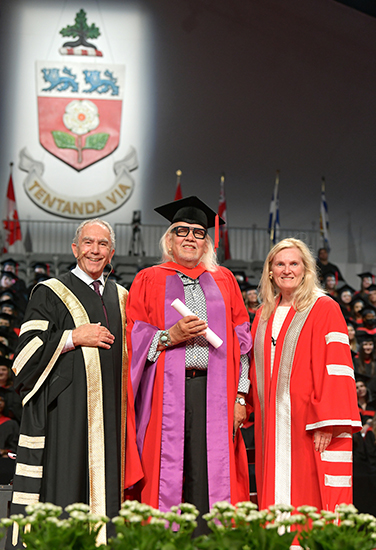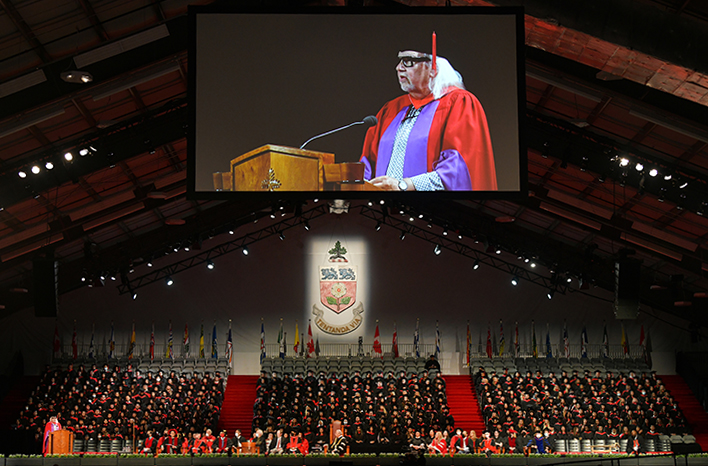
By Jenny Pitt-Clark
During the Faculty of Education convocation ceremony for the Class of 2022 that took place on June 10, Indigenous Elder Duke Redbird delivered a moving and passionate address about Mother Earth, strawberries and universities, and the enduring spirit of a mentor.
The month of June is National Indigenous History Month and in the Indigenous calendar it is also Ode Miin Giizus or Strawberry Moon. June is also a time of new beginnings for York University students as they receive their degrees and embark on the next stage in their lives.
So it was fitting that during Ode Miin Giizus, the renowned poet, actor, journalist and Indigenous Elder, Duke Redbird (MA '78), returned to York University to receive an honorary doctor of laws degree. In his convocation address that he delivered through poetry and a story, Elder Redbird spoke of the importance of strawberries, universities, the nourishment that knowledge provides and the enduring spirit of a mentor to a young strawberry heart.

Elder Redbird began by reciting his celebrated poem “Our Mother The Earth,” which speaks to the essential sustenance and love that Mother Earth provides to all living creatures and the importance of sustaining and protecting her against the perils of climate change. With this poetic setting in place, Elder Redbird, in acknowledgement of Ode Miin Giizus, observed that “the strawberry is shaped like a heart. This fruit is associated with the teaching of ‘truth.’ And unlike every other fruit, the seeds of the strawberries are on the surface, and we humans, like these seeds, occupy the surface of the Earth.”
He noted that universities could also be described as strawberries of knowledge “that require the human heart with the desire for the truth to be nourishing and successful.”
Referring to his own strawberry heart, he told the story of how in 1975, he was interviewed by York University politics Professor Ed Dosman (now professor emeritus) for his research on Indigenous life and culture. For the young Redbird, who was then 36 years old, Dosman’s interview was one of many he had completed with academics who were researching Indigenous Peoples. “I was regarded as a primitive source at the worst, and a layman without a formal education at best,” said Elder Redbird, noting the interviews that quoted him were then used by researchers to acquire degrees and publish papers and yet his knowledge, which was so freely and truthfully shared, was not credited or cited as a source, a visceral concern he relayed to Dosman.
After this conversation, Dosman introduced Redbird to David Bell, then a professor in both political science and environmental studies at York University and a globally recognized expert in learning for a sustainable future. Dosman and Bell offered to sponsor Redbird as a mature student to pursue a master’s degree. “With the support of Professor Christopher Innis, the founder of the master’s degree program in Interdisciplinary Studies at York University, I was accepted as a candidate,” he said.
In the years that followed, enriched with the gifts of knowledge, friendship and mentorship from Bell, the young Redbird’s strawberry heart was nourished and ripened. “On a June day, much like today in 1978, 44 years ago, I was the only recipient of a master’s degree in Interdisciplinary Studies from York University,” said Elder Redbird.
Decades later, it was with a full strawberry heart that Elder Redbird once again turned to Bell. “Dr. David Bell passed in 2017. I wrote ‘Our Mother The Earth’ in 2020 during COVID-19. In my heart of hearts, I choose to believe that my friend David Bell co-authored the poem with me and was there in spirit when I recited it to a global audience last fall at the COP26 conference on Global Warming.” Poetry like science share many of the same insights and create new ways of thinking about the world, said Elder Redbird, who credited the theoretical physicist Carlos Rovelli with the original comparison. Elder Redbird asked the graduands to nourish their own hearts and minds by thinking of “nature as an Earth verse, like the Universe written by the Creator as beautiful, epic poem to embrace our spirits with love throughout our lifetimes.”

In closing his graceful story, Elder Redbird reminded all gathered for the convocation ceremony to continue to feed their own quest for knowledge because they too would eventually become ancestors. “Seven generations from now, the grandchildren of your grandchildren will be seeking the wisdom that you have learned and passed on in your lifetime,” he said. “I want to wish you every conceivable success as you continue to harvest the fruits of your enlightenment that may not have been tasted yet.”
